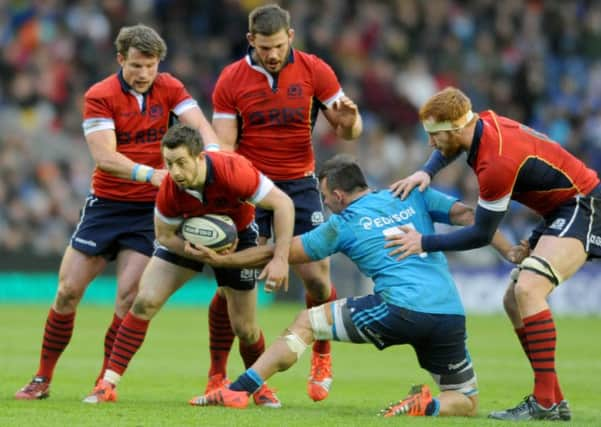Allan Massie: Vern Cotter’s men shaping up nicely


For another, it looks as if Vern Cotter knows what his preferred starting XV will be, and this hasn’t been the case for some time. It will, one supposes, be close to the one that started in Paris.
Of course it was disappointing to suffer another close defeat there, and a win would undoubtedly have been good for morale. But, though the weather conditions made the first half somewhat disjointed, with both teams losing the ball more often than might have been expected, this is a pretty good French team, one which completely outplayed England for more than an hour a fortnight ago. Moreover, given that one of the disappointing features of the Scottish performance was losing our own throw at several lineouts, it’s relevant to observe that England had the same experience in Paris a fortnight ago, before going on to control the lineout against Ireland on Saturday.
Advertisement
Hide AdAdvertisement
Hide AdFor most of the game the Scottish defence was good. While we have all been happy to see Scottish backs displaying flair and scoring tries, it remains the case that successful teams are built on the foundation of a secure defence. Given the criticism of the way in which he had come into the Scotland side, it’s only fair to remark that John Hardie showed just why Vern Cotter was so eager to have him there. The back-row of Hardie, David Denton and Ryan Wilson looks nicely balanced.
Gordon Reid almost certainly didn’t expect to be playing for some 75 minutes, but, coming on so early to take over from Alasdair Dickinson, he did more than hold his own. Of course, as has often been remarked, a scrum that functions well one day may fall foul of the referee’s interpretation of the laws next match. All the same, given that the French are always powerful scrummagers, this Scotland eight can be satisfied with their performance in the tight. No matter how the game changes, if you are on the back foot and in trouble in the scrum, you are in trouble in the match – and much the same goes for the lineout.
The half-backs both had fine games. Russell-and-Laidlaw now slips almost as easily off the tongue as Rutherford-and-Laidlaw did 30 years ago – they go together like ham-and-eggs, Bill McLaren used to say.
Greig Laidlaw is playing the best rugby of his career – at just the right time – and Finn Russell has the self-confidence – even cockiness – to match his talent. His outside break is as smooth as John Rutherford’s used to be, and the little chip-kick that all but put Mark Bennett in for a try was a gem. As for Bennett, he looks capable of dancing his way through any defence; the problem is to select the right moment.
Matt Scott’s handling let him down a couple of times, notably near the end – his wild pass that went into touch and effectively lost the last chance of rescuing a win was as ill-conceived as it was badly executed. But he defended well and ran with dash, and I would suppose that the choice between Scott and Peter Horne may not yet have been made.
There’s probably still uncertainty too about the back three, though one suspects that Stuart Hogg, Sean Maitland, Tommy Seymour, with Sean Lamont on the bench, may be the favoured line-up. It seems likely that, some time during the World Cup, Lamont will get his 100th cap. To have survived since Frank Hadden first picked him way back in 2006 is a tremendous achievement, and he has done so with his determination and enthusiasm undimmed. There have been players with greater natural gifts; not many who have given more for Scotland.
Looking back over the warm-up games, we can probably be as happy as any of our Six Nations friends and rivals. While one knows that comparisons between different matches played on different days in different circumstances are of doubtful value, it’s at least interesting to remark on these two results: Scotland 48 Italy 7; Wales 23 Italy 19 and also: Scotland six tries, Italy one; Wales one try; Italy two.
Two weeks ago, switching the Scottish and Welsh figures would have seemed a more credible forecast. Still, as a warning against optimism, one might also remark that, this time last week, Wales, having beaten Ireland in Dublin, were cock-a-hoop. Now, having been deprived of Rhys Webb and Leigh Halfpenny, there is weeping and wailing in the valleys.